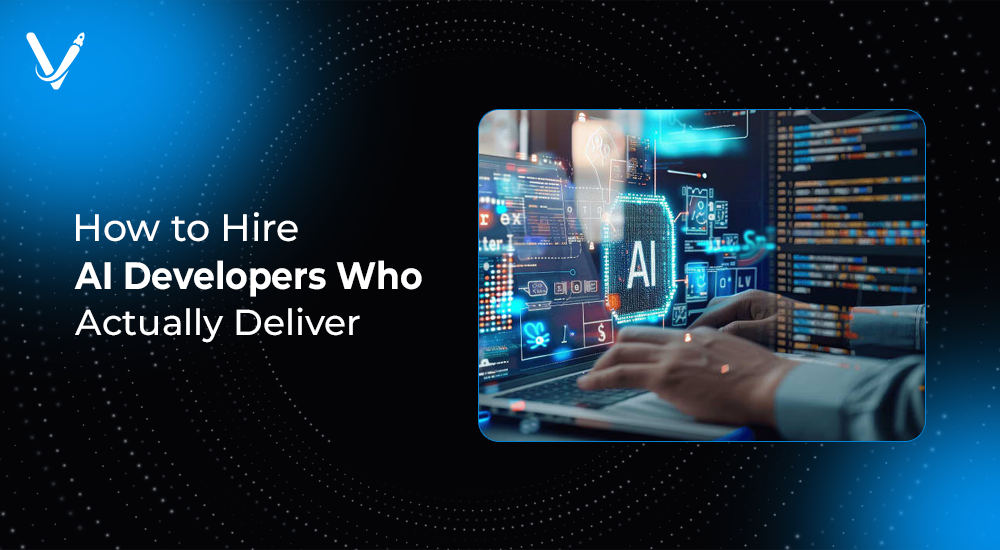How to Hire AI Developers Who Actually Deliver


- Jun 23, 2025
The AI boom has arrived, and businesses across every sector are racing to hire talent. But finding the right AI developers isn't just about scanning resumes for Python and TensorFlow. It’s about identifying people who can solve real-world problems, understand business goals, and turn models into measurable outcomes.
Plenty of candidates know how to run a Jupyter notebook or copy code from Hugging Face. The challenge is finding those rare developers who actually deliver. This article is your guide to spotting, evaluating, and onboarding AI talent that moves the needle—not just prototypes that sit idle.
Hiring the wrong AI developer can set your project back by months, drain your budget, and even damage your brand. A failed proof of concept (PoC) or poorly deployed model can erode stakeholder trust and derail innovation efforts.
On the other hand, hiring the right developer, ideally through a professional AI development company ensures you:
Hiring the right person is about long-term value creation, not short-term wow factor.
AI development is not one-size-fits-all. Before you post a job or review a resume, define what kind of AI talent your business actually needs.
These professionals focus on training and deploying machine learning models at scale. They understand data engineering, model optimization, containerization, and tools like TensorFlow, PyTorch, and MLflow. If your goal is to ship a product that uses machine learning, this is the role to prioritize.
Data scientists thrive on data exploration, experimentation, and model tuning. They are excellent at producing insights and prototypes but may need support from engineers to scale those models into production-ready services.
Ideal for academic partnerships or long-term innovation projects, research scientists push the boundaries of what's possible. They explore novel algorithms and architectures and may publish findings. They often need a supporting team to transition their work into production.
These hybrid developers can do everything from fine-tuning models to integrating them into apps with REST APIs or cloud platforms. They’re especially valuable for startups or teams with limited bandwidth.
Before hiring, your leadership team must answer:
Clarity on these issues will influence everything—from the job description to your technical assessment process. A hire made without clarity is a gamble.
Writing a great job description is your first filter. Talented AI developers have options, and they evaluate you as much as you evaluate them.
Craft your job listing to include:
A brief overview of your company and mission
Avoid copy-pasting generic AI job templates. Customize the language so it speaks directly to developers who care about impact, quality, and purpose.
Job boards are just one piece of the puzzle. To access top-tier AI talent, you need to go where they are.
Review contributions to machine learning libraries, notebooks, or challenges. Look for people who not only participate but document their work clearly and contribute regularly.
Join places like AI Alignment Slack, MLOps Community, or Women in Data Science. These communities are rich with experienced and motivated developers.
Sponsor or attend hackathons like AIcrowd or OpenAI events. Hackathons often reveal not only skill but also how well someone works under pressure and in teams.
Engage with AI thought leaders and practitioners who share projects, write blogs, or host live coding sessions. These individuals are often already deeply engaged in the field and open to new opportunities.
Tap into your existing network. Ask respected developers, CTOs, or advisors for recommendations. Great engineers tend to know other great engineers.
A multi-step process is essential for evaluating both technical capability and team fit.
Look for diversity in projects—NLP, CV, tabular data, etc. Evaluate GitHub activity, project writeups, or public notebooks. Someone who documents their work well is more likely to write maintainable code.
Instead of abstract puzzles, assign a task such as:
Make sure the test simulates their expected role, and give them room to ask clarifying questions.
Talk through designing an AI-powered feature or system. For example: "Design a smart scheduling tool for logistics." Watch how they approach constraints, data pipelines, fail-safes, and edge cases.
Ask them to evaluate a messy ML script. This reveals their coding hygiene, documentation skills, and ability to collaborate on legacy code.
Focus on communication, growth mindset, and ethics. Ask about a time they failed, pivoted, or had to explain a complex model to a non-technical stakeholder.
Hiring mistakes are costly. Watch for:
Even brilliant coders can be liabilities if they’re not team players or can’t ship.
Beyond code, top-performing AI professionals share these traits:
These qualities separate good from great, especially in fast-moving AI teams.
Retention matters more than recruitment. AI developers want:
Offer growth paths into tech leadership, architecture, or applied research. Create an environment where smart, ambitious people want to stay.
Hiring for AI is high-stakes. It’s not about stacking degrees or recruiting flashy resumes. It’s about building a team that delivers AI value consistently and responsibly.
Look for developers who care about outcomes, not just outputs. Who write testable code, care about stakeholders, and understand when simpler solutions beat complex ones. These are the people who will help you build real AI products, not just demo reels.
At Vasundhara Infotech, we specialize in building AI teams that turn complex ideas into real-world impact. Whether you’re building your first model or scaling across cloud platforms, we’ll help you hire AI talent that delivers. Contact us today to get started.
Copyright © 2026 Vasundhara Infotech. All Rights Reserved.
